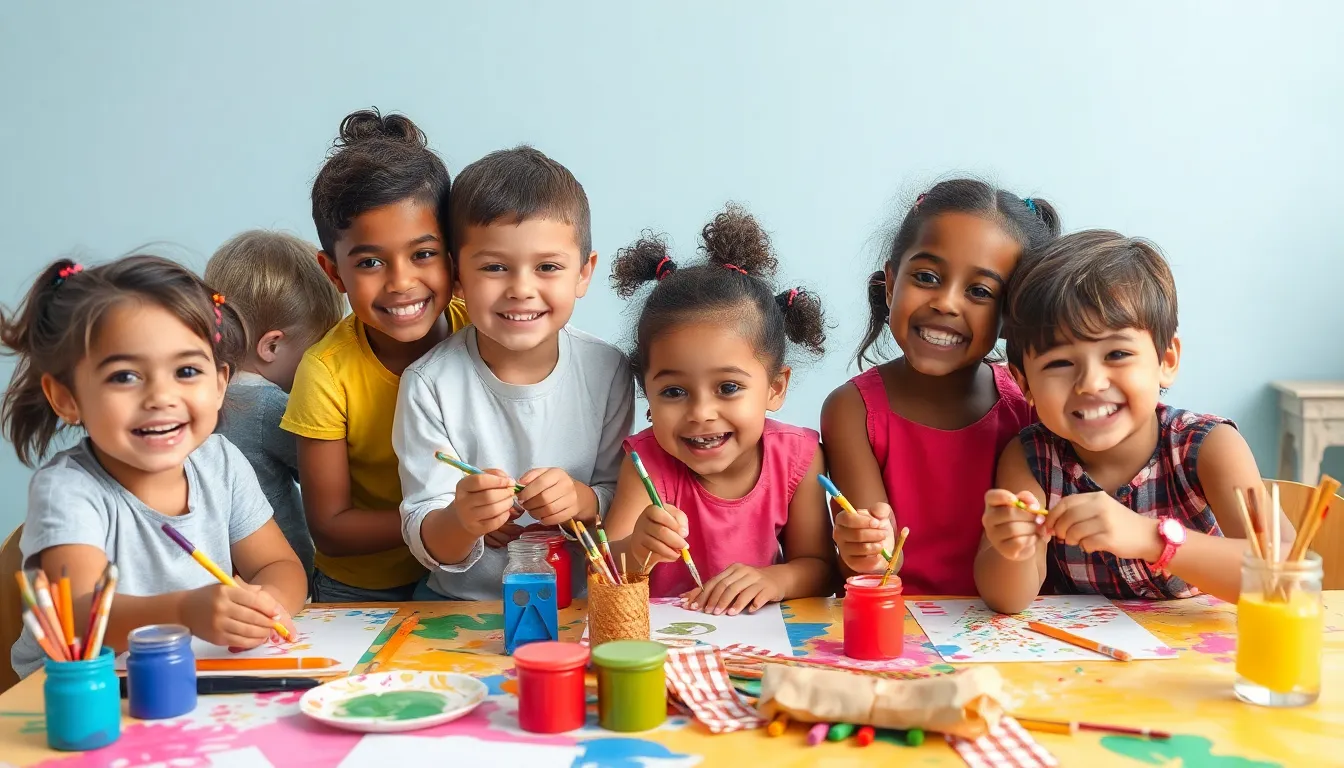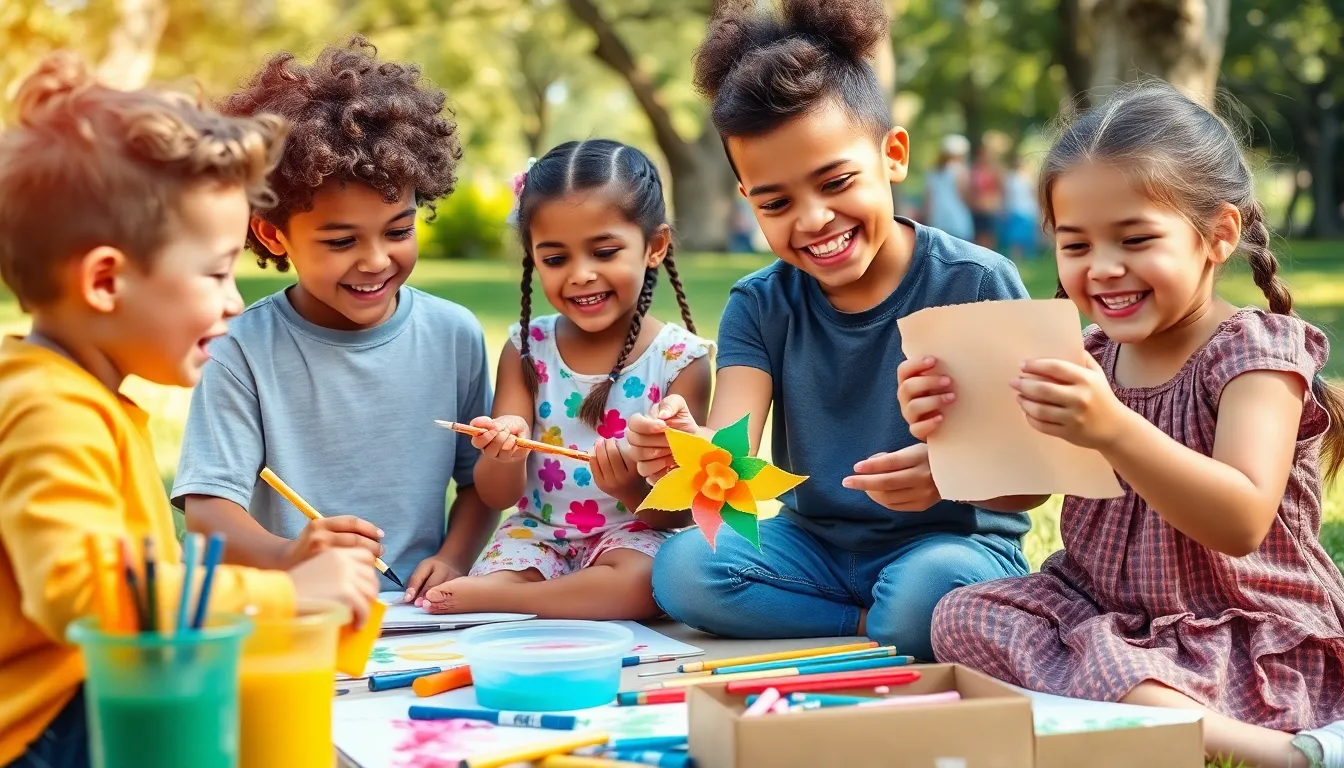When it comes to preschool, the right activities can turn a room full of tiny tornadoes into a whirlwind of creativity and learning. Parents and educators often find themselves juggling the challenge of keeping little ones engaged while sneaking in those all-important lessons. Luckily, with a sprinkle of imagination and a dash of fun, preschool activities can transform any day into an adventure.
Table of Contents
ToggleImportance Of Preschool Activities
Preschool activities significantly contribute to a child’s development. Engaging in hands-on tasks encourages creativity and critical thinking. Participation in group play fosters social skills, enhancing cooperation among peers. These activities stimulate cognitive growth and improve problem-solving abilities.
Movement-based activities promote physical health and coordination. A variety of artistic projects allow self-expression and fine motor skill development. Structured playtime supports emotional regulation, helping children understand their feelings and those of others.
Educational games reinforce foundational knowledge in areas such as numbers and letters. Interactive storytelling improves language skills and stimulates imagination. Science experiments increase curiosity and introduce scientific concepts in an enjoyable way.
Routine participation in preschool activities leads to long-lasting benefits. Children often display increased enthusiasm for learning when engaged in varied experiences. Ensuring exposure to diverse activities cultivates well-rounded individuals who are prepared for future educational settings. Preschool activities also give educators insights into each child’s unique strengths and interests, facilitating tailored learning approaches.
Ultimately, these activities create a rich environment where children can thrive emotionally, socially, and academically.
Types Of Preschool Activities

Engaging preschool activities come in various forms, each contributing to children’s overall development. Here’s a closer look at some key types.
Creative Arts And Crafts
Creative arts and crafts encourage self-expression in young children. Activities like painting, drawing, and sculpting enhance fine motor skills and hand-eye coordination. Using materials such as paper, glue, and recyclable items, kids explore their creativity. Group art projects promote cooperation and teamwork as children work together on a common goal. In addition, these activities allow children to share ideas and appreciate different perspectives, fostering communication skills.
Physical Activities
Physical activities play a vital role in developing a child’s health and coordination. Games such as tag and obstacle courses boost gross motor skills and promote physical fitness. Regular participation in movement-based activities enhances balance and agility. Dancing and simple yoga exercises not only improve flexibility but also provide a fun outlet for energy. Through these activities, children build social skills, as they learn to take turns and support each other.
Educational Games
Educational games serve as effective tools for reinforcing foundational knowledge. Activities like letter matching and number puzzles help preschoolers recognize letters and numbers in an enjoyable format. Interactive storytelling promotes language skills by encouraging active participation and imaginative thinking. Many educational games incorporate problem-solving elements, enhancing critical thinking abilities. This playful approach to learning creates a positive atmosphere, fostering a lifelong enthusiasm for education among young children.
Benefits Of Engaging In Preschool Activities
Engaging in preschool activities fosters essential developmental benefits for children. These activities support various aspects of growth, enhancing cognitive, social, and emotional well-being.
Enhancing Cognitive Development
Engaging in hands-on tasks boosts cognitive development among preschoolers. Educational games and structured activities reinforce foundational knowledge in numbers and letters, facilitating early literacy and numeracy skills. Exploration through science experiments ignites curiosity, encouraging critical thinking. Artistic projects stimulate creativity and improve problem-solving abilities. Regular participation in these activities cultivates a love for learning, helping children grasp new concepts more easily. Furthermore, interactive storytelling enhances language skills and vocabulary development, setting the stage for future academic success. Cognitive growth lays the groundwork for a child’s overall development, making these engaging preschool activities indispensable.
Promoting Social Skills
Participating in group activities promotes essential social skills among young children. Collaborative play fosters cooperation and teamwork, allowing children to learn the importance of sharing and taking turns. Regular interaction with peers enhances communication, helping them express thoughts and feelings effectively. Engaging in physical activities nurtures social bonds, as children navigate play dynamics together. Emotional regulation improves as they learn to manage feelings of frustration or excitement in group settings. These interactions build confidence and empathy, preparing children for future social environments. Overall, preschool activities create valuable opportunities for developing strong social foundations.
Tips For Implementing Preschool Activities At Home
Creating a stimulating environment at home significantly enhances preschoolers’ learning experiences. Designate a specific area for activities, such as a table or a corner filled with supplies. Gathering resources like crayons, paper, and educational toys encourages creativity and exploration.
Incorporating a routine helps children know what to expect. Schedule daily times for activities, balancing structured play with open-ended exploration. Allow flexibility within this routine to adapt to your child’s interests.
Utilize everyday items for creative activities. Household items like empty cardboard boxes, fabric scraps, or nature finds can inspire imaginative play and art projects. Encouraging seizing opportunities for learning in the moment supports engagement and curiosity.
Engage in interactive storytelling sessions to boost language skills. Choose age-appropriate books, and use expressive voices to make stories memorable. Discussing the story’s events encourages critical thinking and comprehension skills.
Encourage physical activities through simple games and movement exercises. Activities like dance, obstacle courses, or scavenger hunts promote physical health and coordination. Invite family members to participate, fostering social interactions and teamwork.
Apply educational games to reinforce foundational knowledge. Utilize apps or online resources designed for young learners to make learning engaging and fun. Include counting games or letter recognition activities to enhance cognitive skills.
Monitor and adjust activities based on your child’s feedback. Observing reactions and preferences allows for tailoring experiences to fit interests and learning styles. Adapting activities ensures they remain engaging and enjoyable.
Sharing these activities with other families encourages community involvement. Organizing playdates or group activities fosters social skills and builds friendships. Collaborative experiences enrich learning and deepen the appreciation for shared joys.
Engaging preschool activities lay the groundwork for a child’s lifelong love of learning. They provide opportunities for creativity and critical thinking while nurturing essential social and emotional skills. By incorporating a variety of activities at home or in educational settings, parents and educators can create enriching environments that cater to each child’s unique strengths and interests.
These activities not only enhance cognitive development but also foster a sense of community among families. As children explore and play together, they build friendships and learn valuable life skills. Prioritizing diverse and interactive experiences ensures that preschoolers remain enthusiastic and prepared for future educational challenges.




